We are pleased to announce the 2019 Association for Mormon Letters Awards finalists in Poetry and Criticism. The final awards will be announced and presented on May 2 at the AML Conference, held in Salt Lake City. We will be announcing the other category finalists over the coming week. The finalists and winners are chosen by juries of authors, academics, and critics. The announcements include book blurbs and author biographies, adapted from the author and publisher websites.
Poetry
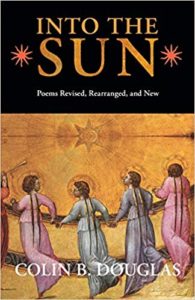 Colin Douglas. Into the Sun: Poems Revised, Rearranged, and New. Walking Lion Press.
Colin Douglas. Into the Sun: Poems Revised, Rearranged, and New. Walking Lion Press.
Into the Sun collects Colin Douglas’s poetry–a curious, enlightening, and disturbing blend of striking imagery, intense spirituality, and subtle eroticism. Dennis Clark, in a review for the Association for Mormon Letters, called Douglas “a man too long in the shadows,” “a remarkable poet” whose work proceeds “with all the clarity, logic, and irrationality of a dream.” Clark explains, “The elements of the dream form a coherent whole without relying on either him or us to know a system of interpretation. That is one of the things that overwhelms me as a reader. The poems do not mean, but be—a state that allows me to inhabit them . . . , trying to find the key to that unknown language.” Colin Douglas writes, “Poems of this kind can be merest glimpses through a window on the infinite and eternal and marvelous and rationally, literally unspeakable mystery of being; . . . of the erotic and convulsively beautiful ecstasy of Eternal Life and Creation.” Douglas introduces his work in this recent AML blog post.
Colin Douglas earned a master’s degree in American literature at Brigham Young University; was employed for twenty years as an editor in the Curriculum Department of The Church of Jesus Christ of Latter-day Saints; and edited and reported for the Magna (Utah) Times newspaper with the former Linda Jean Wells, to whom he was married in 1969. He is the author of several poetry collections, including First Light, First Water; Glyphs; Division by Zero; and Six Poems by Joseph Smith.
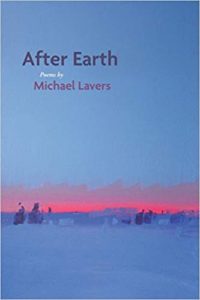 Michael Lavers. After Earth. University of Tampa Press.
Michael Lavers. After Earth. University of Tampa Press.
Part elegy, part ode, part pastoral, part sci-fi, After Earth looks back through history in order to consider history’s end. Many of the poems are drawn from the concerns of a father for his children, from the impulse to record the Earth, to preserve what’s slipping away, and to heal, if poems can, the bifurcation of nature and civilization. Reveling in the ornate as well as the plain, these poems cultivate astonishment not in the promise of another world, but in the here and now, turning “what is is wavering or tattered into permanence,” and praising all they can, as Auden says we must, “for being and for happening.”
Michael Lavers’ poems have appeared in Crazyhorse, 32 Poems, The Hudson Review, Best New Poets 2015, TriQuarterly, The Georgia Review, and elsewhere. He has been awarded the Chad Walsh Poetry Prize, the University of Canberra Vice-Chancellor’s International Poetry Prize, and the Page Davidson Clayton Prize for Emerging Poets. This, his first book of poems, won the 2018 Tampa Review Prize for Poetry. He teaches poetry at Brigham Young University.
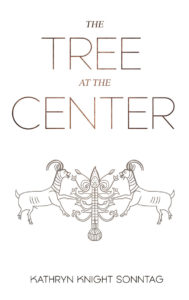 Kathryn Knight Sonntag. The Tree at the Center. BCC Press.
Kathryn Knight Sonntag. The Tree at the Center. BCC Press.
“The Tree at the Center is a beautiful debut volume of poetry that is intelligent and sincere in its look at our wilderness mother, indeed our Heavenly Mother, and the language of women. This book breaks through silence and is also full of an honest look at the speaker’s own experience with motherhood. The poems speak about a voice, at this / distant opening in the sky / not of humankind, not of beast or rain, / that breaks my heart / open as Rilke’s birds do (“Horizon”). In that rich language and voice found here we get to experience something both new and familiar and dear. Something that stirs and is wild. In Kathryn’s words: There / is the Mother, on bended knee / in the great mind of the body, / spurring the horses on / and on and on (“Labor”).”—Laura Stott, author of In the Museum of Coming and Going. Kathryn writes about her book in this recent AML blog post.
Kathryn Knight Sonntag has a BA in English and a BS in environmental studies from the University of Utah and a Master’s in landscape architecture and environmental planning from Utah State University. Her poems have appeared in Shades: The University of Utah’s Literary Magazine; Wilderness Interface Zone; Young Ravens Literary Review; Exponent II; Psaltery & Lyre; and Dialogue: A Journal of Mormon Thought. The Tree at the Center is her first published collection.
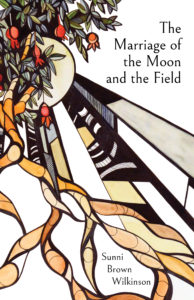 Sunni Brown Wilkinson. The Marriage of the Moon and the Field. Black Lawrence Press.
Sunni Brown Wilkinson. The Marriage of the Moon and the Field. Black Lawrence Press.
“There is much of wonder in a first book of poems: a new voice, a freshness, other ways of being and believing. And so it is with Sunni Brown Wilkinson’s The Marriage of the Moon and the Field. There are marvelous poems here, poems that range through the world: Vienna, Juarez, Andalusia, Mozambique, Venice. The poet tells us ‘I’ve looked into the world and found / my own life reassembled and given back to me / with broken glass and a birdsong.’ There are poems of family (parents, children, grandparents), our primal world, and there are poems of immigrants, asylum seekers, the displaced. And weaving through all of them there is a sweet charity, a belief in grace, and a tenderness toward existence. There is as well a recognition that tragedy and loss make up a part of our lives, but in Wilkinson’s vision these can be redeemed since ‘we’re verses with a space in between / for our own small hallelujah.’ These are poems that ‘you can ride…into tomorrow.’ Sunni Wilkinson is a welcome new poet for our times.”–Joseph Stroud. Sunni writes about her collection in this recent AML blog post.
Sunni Brown Wilkinson’s poetry has been published in Crab Orchard Review, Adirondack Review, BODY, Sugar House Review, Cimarron Review, Southern Indiana Review and other journals and anthologies and has been nominated for two Pushcarts. She holds an MFA from the Inland Northwest Center for Writers at Eastern Washington University and teaches at Weber State University. She lives in northern Utah with her husband and three young sons.
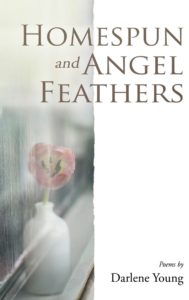 Darlene Young. Homespun and Angel Feathers. BCC Press.
Darlene Young. Homespun and Angel Feathers. BCC Press.
“Darlene Young’s poems celebrate the beauty, humor, and pathos of everyday life in wise and surprising ways. She is unafraid to explore the depth and breadth of familiar subjects, locating the divine in the mundane, exploding the myth that in order to live deliberately, the poet must go out into the woods, alone. Surrounded by a houseful of teenagers, grappling with the demands of middle age, confronting health problems, balancing church and professional responsibilities, simply getting the dishes done—it is in the midst of all of this lived experience that Young stops and takes note. Suffused with crackling language and precise imagery, her poetry helps us stop and take note as well.” –Angela Hallstrom, author of Bound on Earth. Darlene wrote about her collection in this recent AML blog post.
Darlene Young is a poet and essayist who received her MFA from Brigham Young University, where she now teaches Creative Writing. She served as the poetry editor at Dialogue: A Journal of Mormon Thought and Segullah. She served as secretary to AML for years, and received an Award for Service to AML in 2010. She lives in South Jordan, Utah with her husband and sons.
Criticism
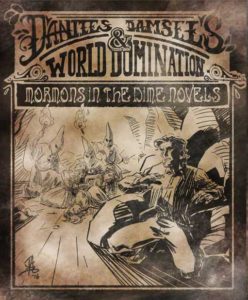
Michael Austin. “Danites, Damsels, and World Domination: Mormons in the Dime Novels.” Sunstone #183.
Austin is co-editor with Ardis Parshall of the Mormon Image in Literature series from Greg Kofford Books, which includes annotated reprints of 19th-century novels about Mormons. Austin discusses how dime novel authors tried to keep the industry alive by wringing every last word out of the standard formulas and stereotypes that had served them so well. As the frontier disappeared, leaving most of the usual villains trapped in the amber of history, the supposedly modern Mormons became an irresistible target because they could be portrayed—not without plausibility—as thinly disguised versions of their worst 19th-century selves.
Michael Austin received his Ph.D. in English Literature from the University of California at Santa Barbara, and is Executive Vice President for Academic Affairs and Provost at the University of Evansville in Evansville, Indiana. He is the author or editor of nine books and more than 50 articles, book chapters, and reviews. His books include New Testaments, a study of biblical typology in the 17th and 18th centuries and That’s Not What They Meant!, an analysis of the debates of America’s Founding Fathers. His composition textbook, Reading the World: Ideas that Matter, is used in more than 200 colleges and universities worldwide, and he has also written widely about Mormonism in literature, including articles on Angels in America, Big Love, The Book of Mormon: A Musical, contemporary mystery fiction, and the works of Terry Tempest Williams, Judith Freeman, and Vardis Fisher. He has won two AML Awards, for “How to Be a Mormo-American; Or, The Function of Mormon Criticism at the Present Time” (Criticism, 1995) and Re-Reading Job: Understanding the Ancient World’s Greatest Poem (Religious Non-Fiction, 2014).
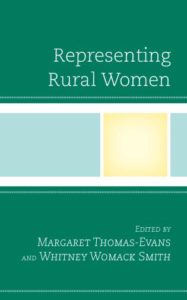 Amy Easton-Flake. “Poetic Representations of Mormon Women in Late Nineteenth-Century Frontier America”. In Representing Rural Women, Whitney Womack Smith, Margaret Thomas-Evans, editors. Lexington Books.
Amy Easton-Flake. “Poetic Representations of Mormon Women in Late Nineteenth-Century Frontier America”. In Representing Rural Women, Whitney Womack Smith, Margaret Thomas-Evans, editors. Lexington Books.
Easton-Flake analyzes poetry published in Woman’s Exponent in 1872-1912, the unofficial organ of the Relief Society, and the first journal “owned by, controlled by and edited by Utah ladies.” The mission of the Exponent included supporting one another and correcting common misrepresentations of Mormon women as ignorant, oppressed, coerced, and even enslaved. She focuses on the poetry of women who lived in remote colonies, for whom the magazine helped to form a virtual community. The poems are important sources for understanding these women’s experiences and views.
Amy Easton-Flake is an Assistant Professor of Ancient Scripture at Brigham Young University. She received her PhD in American literature, with an emphasis in nineteenth-century women’s literature and narrative theory, from Brandeis University in 2011. She also received an MA in women’s studies from Brandeis and an MA in English from BYU. Her research interests include nineteenth-century women’s reform literature, nineteenth-century women’s biblical hermeneutics, Latter-day Saint “home literature” in relation to the larger print culture, the Book of Mormon through a narrative lens, and reception history of the Book of Mormon. Her work may be found in the New England Quarterly, Symbiosis: A Journal of Transatlantic Literary and Cultural Relations, Journal of Mormon History, Religious Educator, and multiple edited volumes.
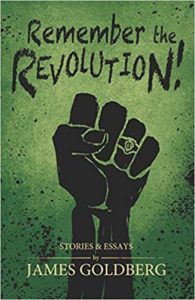 James Goldberg. “Wrestling with God: Invoking Scriptural Mythos in LDS Literary Work”. In James Goldberg, Remember the Revolution: Mormon Essays and Stories.
James Goldberg. “Wrestling with God: Invoking Scriptural Mythos in LDS Literary Work”. In James Goldberg, Remember the Revolution: Mormon Essays and Stories.
While relatively few LDS literary writers will ever make money writing for LDS audiences, the rare abundance and richness of materials in this relationship means that especially effective writing can take place given a little craft. Taking scriptural allusions as sample cases, Goldberg discusses the properties and qualities of the material, and then discusses the types of simple machines contemporary LDS writers are assembling out of scripture.
James Goldberg‘s family is Jewish on one side, Sikh on the other, and Mormon in the middle. His plays, essays, and short stories have appeared in numerous publications, including Shofar, Drash, The Best of Mormonism: 2009, and Jattan Da Pracheen Ithas. He founded the Provo-based New Play Project, and several of his plays can be found in the anthology Out of The Mount. He has won AML Awards for Drama (The Prodigal Son, 2008) and Novel (The Five Books of Jesus, 2012). Other publications include two poetry collections, Let Me Drown With Moses (2015, an AML Poetry Award finalist) and Phoenix Song. In 2019 he published The First Five-Dozen Tales of Razia Shah and Other Stories, and Remember the Revolution: Mormon Essays and Stories. Goldberg has taught persuasive and creative writing at BYU and has written for the LDS Church History Department.
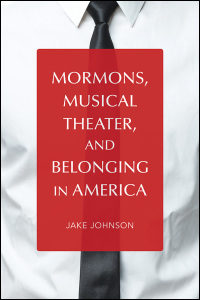 Jake Johnson. Mormons, Musical Theatre, and Belonging in America. University of Illinois Press.
Jake Johnson. Mormons, Musical Theatre, and Belonging in America. University of Illinois Press.
The Church of Jesus Christ of Latter-day Saints adopted the vocal and theatrical traditions of American musical theater as important theological tenets. As church membership grew, leaders saw how the genre could help define the faith and wove musical theater into many aspects of Mormon life. Jake Johnson merges the study of belonging in America with scholarship on voice and popular music to explore the surprising yet profound link between two quintessentially American institutions. Throughout the twentieth and twenty-first centuries, Mormons gravitated toward musicals as a common platform for transmitting political and theological ideas. Johnson sees Mormons using musical theater as a medium for theology of voice—a religious practice that suggests how vicariously voicing another person can bring one closer to godliness. Voice and the musical theater tradition provided a site for Mormons to negotiate their way into middle-class respectability. At the same time, musical theater became a unique expressive tool of Mormon culture.
Jake Johnson is an assistant professor of musicology in the Wanda L. Bass School of Music at Oklahoma City University. He earned his PhD in Musicology at UCLA. His scholarship can be found in American Music, Journal of the Society for American Music, Tempo, Journal of Popular Music Studies, Twentieth-Century Music, and Dialogue.
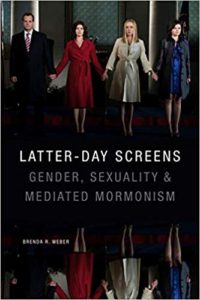 Brenda R. Weber. Latter-day Screens: Gender, Sexuality, and Mediated Mormonism. Duke University Press.
Brenda R. Weber. Latter-day Screens: Gender, Sexuality, and Mediated Mormonism. Duke University Press.
In Latter-day Screens, Brenda R. Weber argues that mediated Mormonism contests and reconfigures collective notions of gender, sexuality, race, spirituality, capitalism, justice, and individualism. Focusing on Mormonism as both a meme and an analytic, Weber analyzes a wide range of contemporary media produced by those within and those outside of the mainstream and fundamentalist Mormon churches, from reality television to feature films, from blogs to YouTube videos, and from novels to memoirs by people who struggle to find agency and personhood in the shadow of the church’s teachings. The broad archive of mediated Mormonism contains socially conservative values, often expressed through neoliberal strategies tied to egalitarianism, meritocracy, and self-actualization, but it also offers a passionate voice of contrast on behalf of plurality and inclusion.
Brenda R. Weber is Professor of Gender Studies at Indiana University, editor of Reality Gendervision: Sexuality and Gender on Transatlantic Reality Television, and author of Makeover TV: Selfhood, Citizenship, and Celebrity, both published by Duke University Press.
